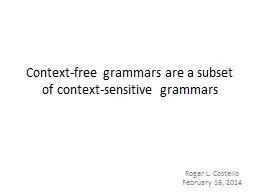PPT-Context of the Play
Author : luanne-stotts | Published Date : 2016-03-12
1912 and 1946 Consider Why a play first performed in 1946 should be set in 1912 There are various reasons why Priestley has done this Consider the following points
Presentation Embed Code
Download Presentation
Download Presentation The PPT/PDF document "Context of the Play" is the property of its rightful owner. Permission is granted to download and print the materials on this website for personal, non-commercial use only, and to display it on your personal computer provided you do not modify the materials and that you retain all copyright notices contained in the materials. By downloading content from our website, you accept the terms of this agreement.
Context of the Play: Transcript
Download Rules Of Document
"Context of the Play"The content belongs to its owner. You may download and print it for personal use, without modification, and keep all copyright notices. By downloading, you agree to these terms.
Related Documents














